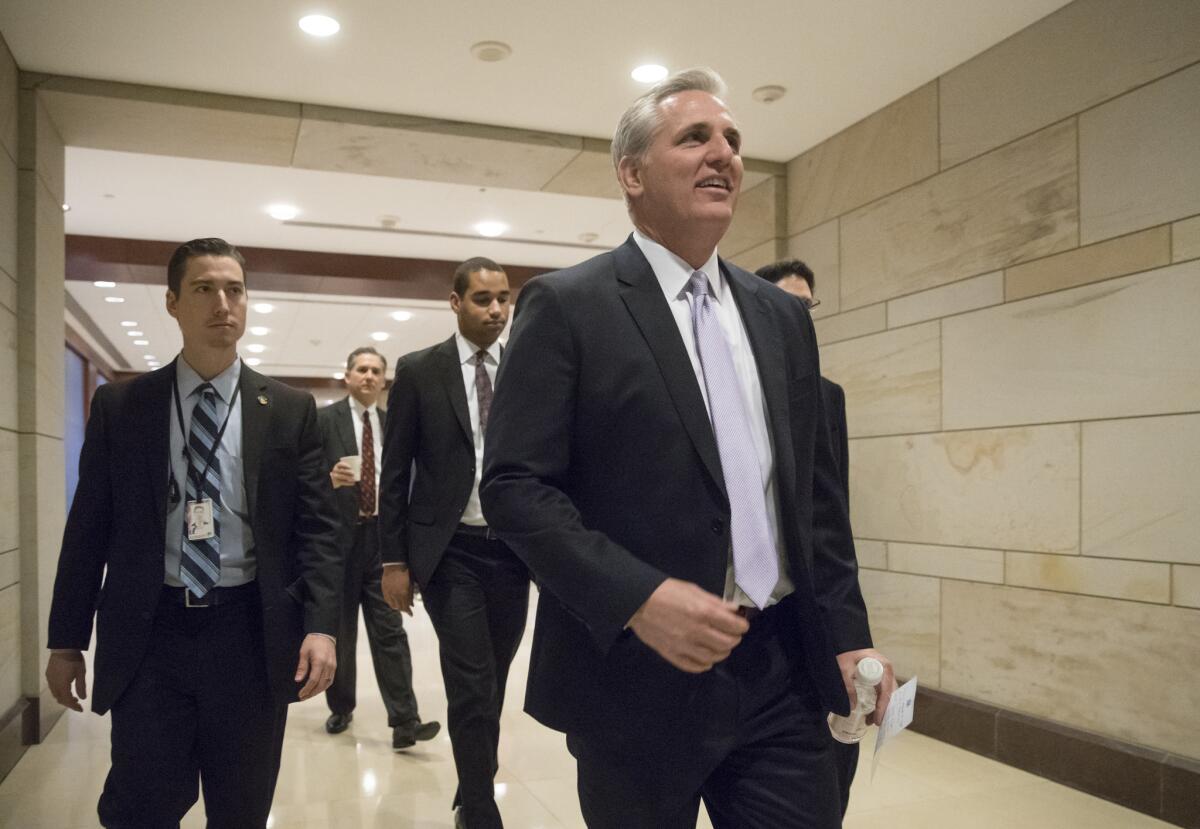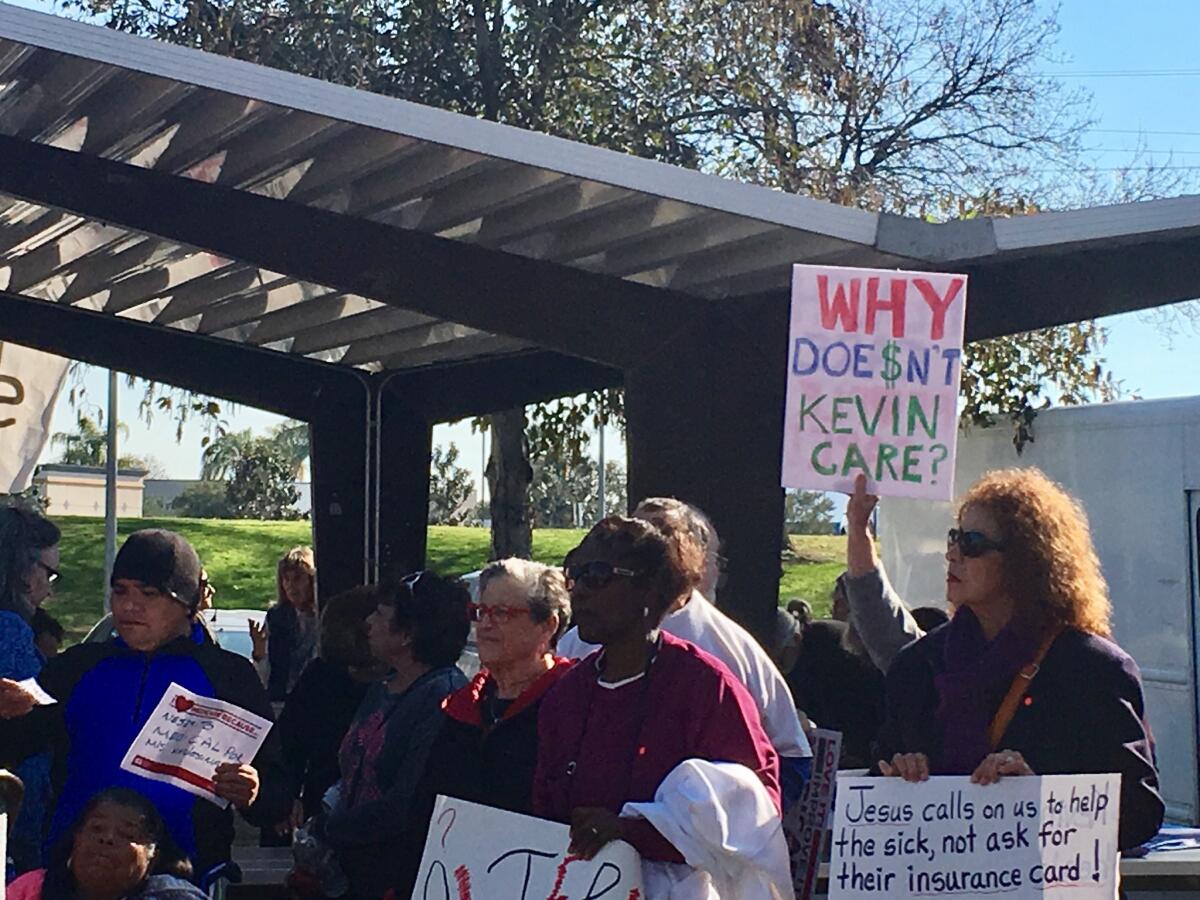People from all around California are heading to the Central Valley to defend Obamacare. Here’s why

- Share via
Bakersfield — The crowd of hundreds was ready to march, winding a circuitous route from a Bakersfield park to the nearby district office of Rep. Kevin McCarthy to rally in support of the Affordable Care Act. But before they hoisted their signs and joined in healthcare-themed chants, there was a quick geographic roll call.
“How many of you are from Bakersfield?” asked the emcee. About half the attendees cheered. The rest had come from farther-flung homes: Long Beach, Sacramento, Riverside. They had traveled via chartered bus, largely with labor unions or grass-roots liberal groups, to the heart of the California effort to save Obamacare.
A potent mix of politics and policy has drawn the Central Valley into the center of the debate around the future of the Affordable Care Act. It is the region in the state most transformed by the landmark healthcare law. It is also a rare Republican enclave in California, represented in Congress by members of the majority party that will determine the law’s fate — including McCarthy, who, as House majority leader, commands a top post in the GOP.

The spotlight on the region has captured the attention of California’s leading Democrats. The week before the rally, a gaggle of Democratic state legislators — mostly representing Bay Area and Los Angeles-area districts — convened in Bakersfield for a hearing on the potential effects of an Obamacare repeal. Other top party officials — from Gov. Jerry Brown to Insurance Commissioner Dave Jones — have pointedly made note of the region’s healthcare landscape in recent missives.
For some Central Valley residents, the attention is long overdue.
“The Central Valley has felt like the stepchild of the state for a while,” said Assemblyman Joaquin Arambula (D-Fresno). “The expansion of the Affordable Care Act has allowed us the opportunity to see what healthcare looks like for the rest of the state, and it’s concerning to think about taking a step backwards.”
When state Sen. Ed Hernandez (D-West Covina) decided to convene an offsite Senate Health Committee hearing last month, he opted for Bakersfield.
“If they completely eliminate the Affordable Care Act … we would have the most devastating effects in the Central Valley,” Hernandez said.
The number of people without health insurance in the region plunged under the healthcare law. In Kern County, home of Bakersfield, the uninsured rate dropped from more than 18% in 2013 to just under 8% in 2015, according to the UC Berkeley Labor Center. In Arambula’s home of Fresno County, the rate dropped from 17.9% to 9.8%.
Tens of thousands of the newly insured receive federal subsidies to shop on the Covered California healthcare exchange, but the most dramatic impact in the region came from the expansion of Medi-Cal, subsidized care for the poor that was broadened to cover childless adults.
Statewide, about a third of residents receive Medi-Cal. But in several counties in the San Joaquin Valley, including Tulare, Merced and Fresno, around half the population is enrolled in the program.
If they completely eliminate the Affordable Care Act … we would have the most devastating effects in the Central Valley.
— Sen. Ed Hernandez (D-West Covina)
Carmen Morales-Board, a nurse practitioner at Kern Medical Center, said she’s seen the effects in the types of patients she treats.
“Our clinics are full. It’s a lot of Medi-Cal expansion patients who didn’t have coverage before,” she said. Meanwhile, emergency rooms are less crowded with non-urgent needs.
“I see patients that really need the surgery,” she said. “I don’t see a bunch of patients to get their medication refilled like I did five years ago.”
The law’s detractors agree Obamacare has changed the Central Valley — but not for the better.
“We don’t have nearly enough specialists in the valley, and patients who have coverage have been subject to severe hikes in their premiums,” Rep. Devin Nunes (R-Tulare) said in a statement.
But proponents argue that a repeal would affect more than insurance coverage, pointing to a UC Berkeley estimate that more than 200,000 healthcare-related jobs would be at risk in a region that has lagged economically compared with the rest of the state.
The statewide job loss figure “plays differently in the Bay Area than it does in the Central Valley, which still has 8[%] or 10[%] or 11% unemployment,” said Anthony Wright, who leads the advocacy group Health Access.
The Central Valley’s elected officials also serve as tempting political targets. Democrats are eager to put the pressure on McCarthy, the No. 2 Republican in the House of Representatives.
Along with Republican House Speaker Paul D. Ryan of Wisconsin and Senate Majority Leader Mitch McConnell of Kentucky, “he’s the one calling the shots,” Wright noted.
A spokesman for McCarthy did not respond to a request for comment. But in a letter to the Sacramento Bee last month, McCarthy charged that critics were not taking into account that Republicans will not just repeal the existing law, but intend to replace it with their own plan. Congressional Republicans so far have not coalesced around a replacement proposal.
McCarthy also dismissed the statistics of expanded coverage under Obamacare as “meaningless,” arguing that “the number of insured matters little when the quality of the insurance is so dismal.”
Proponents acknowledge that targeting McCarthy is mostly symbolic. As a leader in the party that has railed for years against Obamacare, he is unlikely to change his opposition to the law. And after winning 70% of the vote for reelection last year in a solidly Republican district, his seat is hardly vulnerable.
But advocates are also hoping their message resonates with Republicans in nearby districts, who are in more perilous territory.
The district of Rep. David Valadao (R-Hanford), for example, borders McCarthy’s, but his constituents backed Democratic presidential nominee Hillary Clinton over President Trump by a 15-point margin.
Valadao and Rep. Jeff Denham of Turlock are among seven California Republicans designated as targets by national Democrats in the 2018 midterm election.
“There is no doubt we have a healthcare crisis on our hands. Our healthcare system was broken before Obamacare, but the new law made it worse. That’s why we need to find a better solution,” Valadao said in a statement. “As Congress considers alternatives in the coming days and weeks, I will make sure the needs of my constituents are heard loud and clear in Washington. Ensuring quality healthcare is available, accessible, and affordable, especially for low income families, is my top priority.”
The lack of a consensus on a replacement plan has made it difficult for Republicans to counter dire warnings of the consequences of a repeal. But defenders of the law have an uphill battle in winning popular support as well. Though approval of Obamacare has climbed since Trump’s election, it still remains a politically divisive issue.
The California Endowment, a nonprofit that helped enroll people when the law went into effect, is now focusing on collecting stories of those covered.
“It’s not always 100% rosy,” said Daniel Zingale, a senior vice president with the foundation. “People will tell you what’s working and what’s not.”
He said the outreach serves another purpose: to start chipping away at the inequalities the Central Valley has long suffered.
“That region of the state is neglected by all sectors — not just by policymakers, but by philanthropy,” Zingale said. “We’re trying to make some amends for having half of our state geographically be neglected, disconnected, disenfranchised. We have a lot of catching up to do.”
Others in the region are looking to capitalize on the attention. Arambula, a former emergency room physician, has introduced legislation to build a medical school at Fresno State in a bid to address the region’s doctor shortage.
“From a crisis, an opportunity,” Arambula said.
And while some in the Central Valley may blanch at the influx of coastal residents rallying on their turf, others said they were exhilarated by the attention.
“I’m so proud of every person out here,” said Karen Sherman, 72, a Bakersfield resident who cares for her disabled son. “Normally we’re hidden. We’re overlooked constantly.”
Follow @melmason on Twitter for the latest on California politics.
Democrats target 7 congressional seats held by California Republicans for 2018 midterm elections
On Kevin McCarthy’s home turf, Democratic legislators warn against Obamacare repeal
More to Read
Sign up for Essential California
The most important California stories and recommendations in your inbox every morning.
You may occasionally receive promotional content from the Los Angeles Times.










